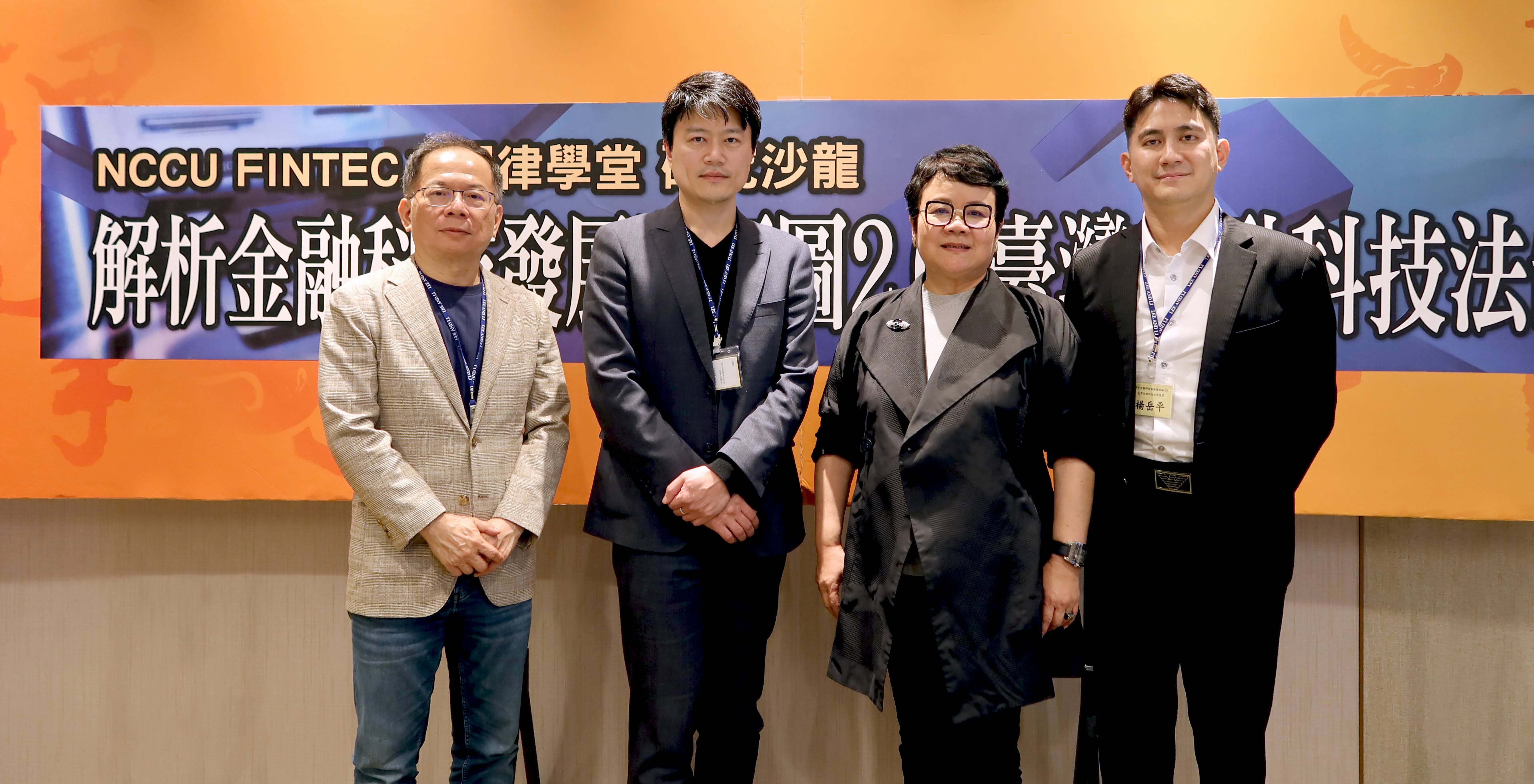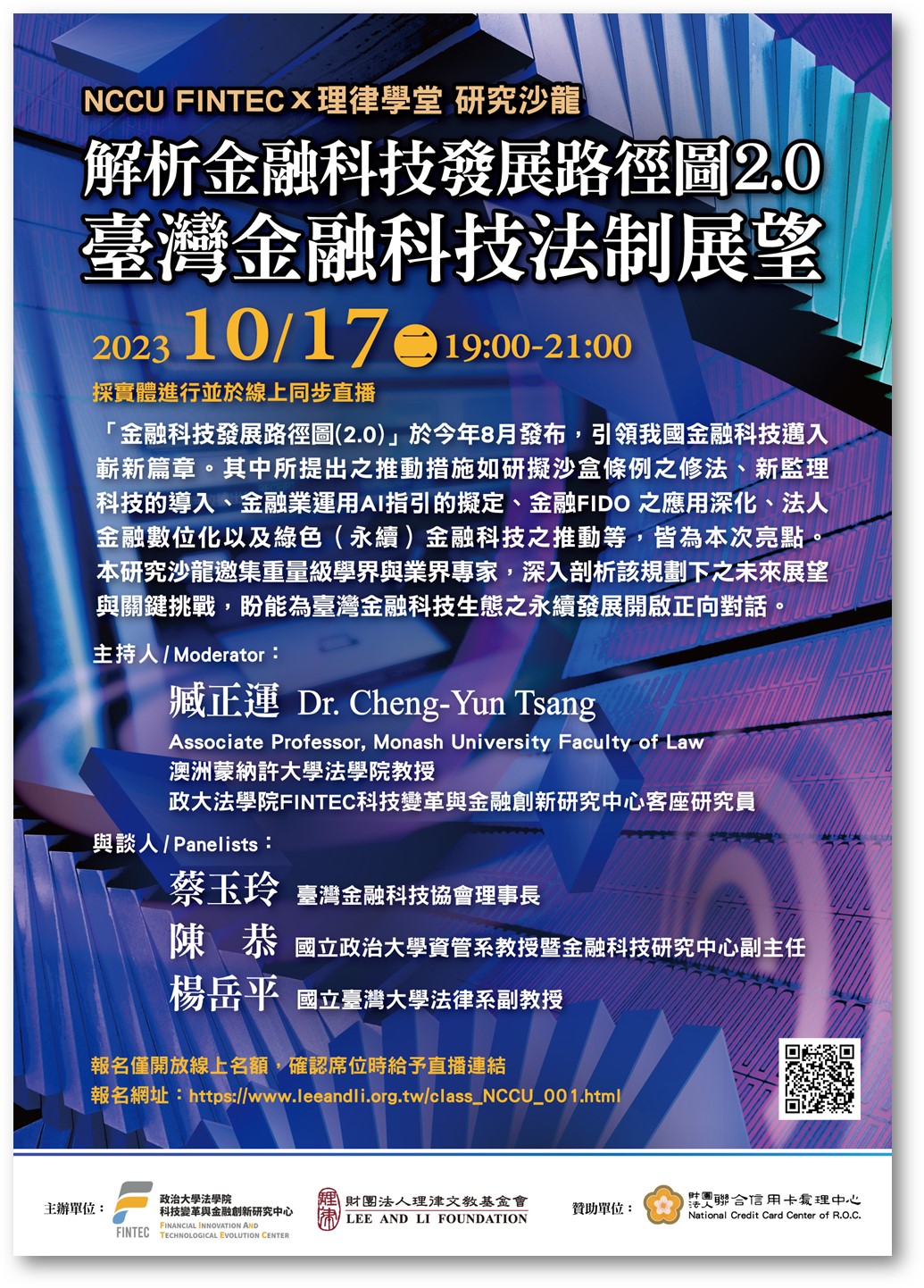
The research salon was moderated by Professor Cheng-Yun Tsang from Monash University, a non-resident researcher of our Center, inviting local academic and industrial experts to participate in the dialogue. They are attorney Jacklyn Tsai, President of the Taiwan FinTech Association, Professor Kung Chen, Deputy Director of the Fintech Research Center NCCU College of Commerce, and Dr. Yue-Pin Yang, Associate Professor at the College of Law NTU. We had approximately 200 guests attended on-site and online. Dr. Chin-Wen Wu, Director of our Center, and Professor Li-Dar Wang, Deputy Director of our Center, also attended this event. As the 'Fintech Development Roadmap 2.0' released in August this year, the attendees shared their opinions about this plan's prospects and critical challenges. This event aims to be helpful for the sustainable development of Taiwan's fintech ecosystem.
In the opening session, the moderator, Professor Tsang, explained the background of the development of the related legal system. The ‘Fintech Development Roadmap 2.0’ was released in August this year, based on the implementation of ‘Fintech Roadmap 1.0’ over the past three years, collected feedback from eight groups of stakeholders, and drew on the successful experience of leading countries. To create a more inclusive, fair, and sustainable financial technology ecological environment in line with international standards, the ‘Fintech Development Roadmap 2.0’ has four areas of effort:
- Optimizing the legal system and policies
- Investing comprehensive counseling resources and cultivating talents
- Promoting financial technology and application
- Enhancing financial inclusion and popularizing digital finance
Dr. Yang affirmed the accomplishment of ‘Roadmap 1.0.’ He also pointed out that Roadmap 1.0 and 2.0 have different goals and priorities; the former has specific plans for task orientation, and the latter focuses on directional planning. Regarding optimizing the legal system, the four points mentioned are relatively abstract. They are the regulatory adaption platform, the fintech regulatory platform, cross-market data sharing, and the guideline of AI adaption in the financial industry. It may leave room for the rapid development of fintech. However, there may be different understandings of the plan. More communication is a must to narrow the possible gap.
As the project's principal investigator for developing Roadmap 2.0, Professor Chen said most of the suggestions have been adopted, such as establishing a fintech development sustainability fund. However, the focus of 'Roadmap 2.0' is on the technology applications of traditional financial institutions. The critical problems of technology companies in the ecosystem regarding compliance with finance-related laws and regulations still need to be solved. Facing many challenges, such as financial companies having considerable difficulty recruiting technology talents, and respondents expect cross-ministerial integration of the government have yet to make a clear plan.
President Tsai emphasized that the most crucial thing in financial technology is the coexistence of FINTECH and TECHFIN. FINTECH is the technology application in financial institutions, and TECHFIN is a financial service provided by technology companies. However, technology companies are less accustomed to communicating with economic government authorities than financial companies. Technological change continually evolves quicker than regulations. Once the government units cannot give regulatory opinions promptly, technology companies often bear the risk of uncertainty in compliance with this law, and it is difficult for start-ups to obtain investment funds. The industry looks forward to more precise industrial policies, friendlier regulatory regimes, and explicit guidance.
President Tsai’s observation to the core sparked a heated discussion. Dr. Yang said that the understanding of fundamental laws and regulations of technology companies needs to be improved, and the government can focus on counseling in addition to financial subsidies. Dr. Yang believed the establishment of a cross-ministerial organization was optional. Data sharing is a good example. The personal information law is not an obstacle but a matter of confidentiality obligations for financial institutions. Solving the problem can be done without cross-ministerial meetings. The prosecution unit usually co-work with the FSC when handling cases, and there is no need to set up a separate cross-ministerial organization. However, Dr. Yang agreed that the regulatory adaptation platform in the roadmap should play a more critical role.
Professor Tsang was also the project's principal investigator for developing the roadmap 2.0. It's problematic if the fintech industry is entirely out of the government's control or wholly controlled. The current fintech innovation regulations are relatively vague. The problem is a question of regulatory clarity and different understanding. Professor Tsang shared his communication with foreign companies and government authorities, and all agreed to list legal and compliance as the key priority. The attendees believed we should invest more counseling resources and encourage discussion with the legal departments to obtain substantive help. That will be more important than holding competitions. The regulatory adaptation platform of the roadmap may help for effective communication. Based on his experience with a non-legal background to learn the related laws and regulations, Professor Chen also suggested more investment to strengthen the understanding of laws and regulations. And the industry should embrace a proactive mindset to study. The resources of financial parks and campuses can also be integrated.
At the final session, speaking of the outlook for Taiwan's fintech industry, the expansion of technology with international competitive advantage into the global market is an essential direction due to the limitation of the scale of the local financial market. The most precious asset of Taiwan is freedom; so many young talents have fantastic creativity. We see the government is full of good intentions. The more precise industrial policies and minimal regulatory uncertainty help more new entrepreneurs from Taiwan to win the international market. It even strengthens national security when Taiwan is an attractive destination for foreign investors. At the same time, the traditional financial industry is expected to keep pace with the times and develop sustainably by applying technology.


